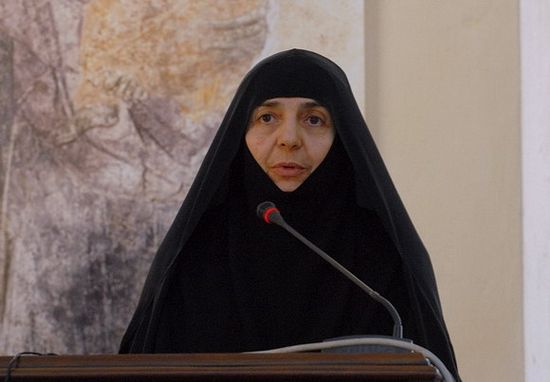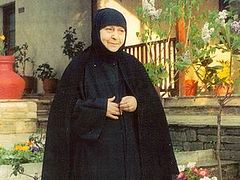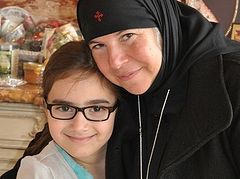The obedience of abbot or abbess is one of the most complex obediences in a monastery. A monk or nun bears the responsibility for his or her own spiritual life, while the abbot or abbess answers before God for the entire monastery. Gerondissa Theoxenia talks about her obedience as the abbess of the Stavropegic Monastery of the Life-Giving Spring–Chrisopigi, in the city of Chania, on the island of Crete.
The status of abbess and the responsibility placed on her for leading the monastery does not exclude the possibility of direct communication with each sister; neither does it diminish affectionate and consoling relationships, or the abbess’s motherly love.
The abbess’s motherly mercy acquires in a monastery a depth of meaning and spiritual breadth, because it is directed not at children born according to nature from a maternal womb, but to children born in the Spirit. For this reason her maternal compassion can embrace all, including sick and rebellious sisters, and of course, wandering nuns,[1] seeking spiritual support.
The abbess personally works on strengthening and supporting every member of the sisterhood in their sorrows, trials, and spiritual quests, encompassing also candidates for monasticism living in the monastery, novices, and those who are still in the stage of looking for a monastery.
With God’s help, the abbess finds ways to overcome difficulties and to heal spiritual illnesses. In order to achieve this the abbess is called to love each sister with a spiritual love, to instruct with love, and to endure the infirmities of her spiritual children, just as the Lord endures our sins. However, in certain cases it is necessary for her to point out mistakes and maintain control.
According to the holy fathers, care for souls and an educational relationship is based on meekness, polite communication, condescension, an individual approach to each sister, and of course, respect. A monastery in which all the members simply submit to the abbess’s orders is a volcano, which will soon erupt, and the whole sisterhood will disperse. The goal is that an atmosphere of mutual love between the sisters would reign in the monastery and that all the sisters would feel a personal connection and spiritual communion with the gerondissa.
In an organized coenobitic monastery, where the sisters labor ascetically and live according to the Gospel law, Orthodox Tradition, and sacred canons, the abbess’s decisions express the consciousness of the entire sisterhood. It follows that the person of the abbess be an object of general trust and approval, because the whole sisterhood is looking at her. The Abbess is called to resolve any conflicts or disagreements that arise, to unite the sisterhood, and maintain unanimity.
The well-known clairvoyant and grace-filled elder, St. Porphyrios of Kapsokalyvia (+1991), canonized among the saints by the Ecumenical Patriarch on November 27, 2013, prayerfully supported and spiritually cared for many monastic brotherhoods and sisterhoods not only in Greece, but also beyond her borders.
St. Porphyrios considered it a necessary condition for an abbot or abbess before [they are chosen as abbot or abbess] to themselves acquire the experience of laboring in obedience. He particularly emphasized that he or she should first pass through the furnace of obedience, in order to be in a condition to place him or herself in the position of the one they are calling to obedience.
St. Porphyrios also noted that in order to lead the brothers (or sisters), the gift of discernment is needed. He considered the most important element for bringing the souls of the sisters and the abbess together to be mutual trust—a trust that allows each sister to feel sure and safe at the revelation of thoughts and mistakes, not fearing rejection at this. Therefore the elder also emphasized that the abbess must be condescending in order to understand well the psychological/emotional makeup of each nun, and that she has to pray. He said that gentle methods are needed in relationships with the sisters. In order to accept others and lead them, in order to receive the revelation of their thoughts, she has to be holy herself. The abbess should instruct others with her counsel, and radiate meekness and love.
To abbesses who grieve and are anxious over the mistakes of their sisters, the elder prompted saying little in the moment that the difficulties and temptations arise, but to later encourage the souls to make new efforts.
St. Porphyrios assured them that when an abbess is filled with true sympathy and pain for the difficulties and struggles of every soul, then a subtle work takes place with the soul, thanks to which the person can with God’s help be spiritually reborn, and discover new perspectives. The saint said that the mother abbess is called to love the sisters with a spiritual love, covering their sins and mistakes. She is called to direct them to the Light and beauty of Paradise. He said that this movement of prayer unites and imparts grace to the whole sisterhood.




